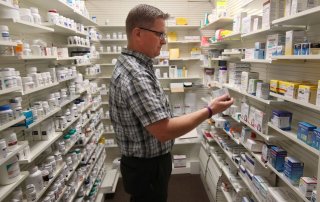How Idaho’s Prescient Pharmacy Reforms Prepared It for the Coronavirus
Other states should follow their lead.
The coronavirus crisis hit states hard and fast, leaving little time for preparations to limit the spread of the virus or reduce its harm. As a result, many states have been caught playing catch-up since the crisis began, scrambling to suspend regulations that create barriers to healthcare delivery and to rapidly build up workforces for contact-tracing and testing.
Few could have predicted the coronavirus pandemic or how states would need to respond, but one state has shown that a decade’s worth of reforms to the practice of pharmacy can help prepare for such an emergency. That state is Idaho, and the other 49 should take notice of its trailblazing pharmacy reforms.
In early 2019, Idaho Governor Brad Little signed legislation granting the state’s pharmacists substantial leeway to prescribe simple medications to their patients. While patients in other states must usually visit a physician in order to obtain a prescription for medication to fight the flu, combat cold sores, or address other minor medical conditions, pharmacies in Idaho are now a one-stop-shop for minor ailments. That’s because pharmacists there can now conduct the same low-risk tests a doctor would, along with prescribing, and dispensing medications all in the same visit.
Expanding pharmacists’ prescribing authority was probably the most impactful reform, but Idaho liberalized the industry in other ways too. In fact, this was the terminus of a broad set of reforms, ongoing in the state since 2011.
It’s now easier for pharmacists from other states to obtain a license and practice in Idaho, due to a new licensing reciprocity law. And as a result of changes to telepharmacy laws, pharmacies can now dispense medication with a licensed pharmacist overseeing the facility from off-site.
Eased telepharmacy restrictions have enabled multiple pharmacies to open in rural communities, some of which have not had a pharmacy for many decades. Since licensed pharmacists can manage a dispensing pharmacy from off-site, they can now oversee multiple pharmacies at once, providing patient consultations through video conferencing. This greatly reduces the costs of operating pharmacies in smaller communities.
During an era of social distancing, these new pharmacies are of enormous value. They keep individuals who have been exposed to the coronavirus from traveling to a different city to get medication or get tested. Moreover, Idaho, like some other states, has struggled with a substantial shortage of primary care providers, particularly in rural communities. The combination of new pharmacies opening and pharmacists’ expanded prescribing authority greatly expands access to care.
While these reforms started long before the first U.S. coronavirus case was detected, they laid the groundwork for a more rapid and effective health care response in several ways.
First, Idaho’s reforms will allow pharmacists to conduct coronavirus testing and prescribe, if need be, based on the results of those tests. This is important because the FDA has clarified that FDA-approved point-of-care coronavirus tests can be used by authorized facilities, including pharmacies, that possess federal waivers. However, additional restrictions still stand in the way in many states, which is why Idaho’s flexibility is so critical.
Second, pharmacists are able to take stress off of other parts of the health care system. If someone who only needs a simple prescription can get it from their pharmacist, they won’t end up in a doctor’s office or an emergency room. This allows those professionals to focus on more serious cases. It also reduces patients’ risk of exposure to the virus.
Third, because pharmacists in Idaho are already used to performing basic testing as part of their everyday routine, once coronavirus tests are widely available, pharmacists can hit the ground running. Pharmacists in other states, meanwhile, may need to brush up on their testing skills. Although they have the necessary training, many won’t have used this expertise since their days in pharmacy school.
Finally, Idaho’s licensing reciprocity reform has positioned the state well if it were to face a shortage of pharmacists. Before the crisis, pharmacists had been flocking to Idaho because of its attractive work environment for their profession, making a shortage less likely. Even if one arises, out-of-state pharmacists can be expedited through the Idaho licensing process.
Idaho’s preparedness for the coronavirus crisis was no accident. The advocates for Idaho’s reforms extolled the value of flexibility. They wanted pharmacists to be able to respond to changes on the ground rapidly, and they wanted patients to have alternative access points to care. While it is impossible to predict when and where a crisis will occur, reforms like Idaho’s can prepare other states by encouraging innovation and flexibility, some of America’s greatest strengths.
James Broughel is a senior research fellow with the Mercatus Center at George Mason University. Phil Haunschild, an Idaho resident, is a J.D. candidate at GMU’s Antonin Scalia Law School and a public policy consultant.
Image: Reuters

